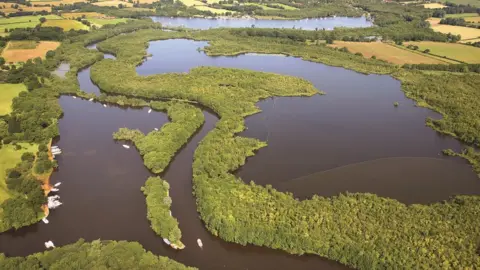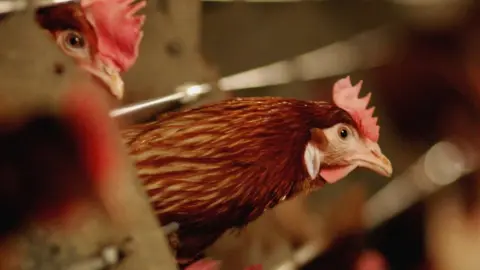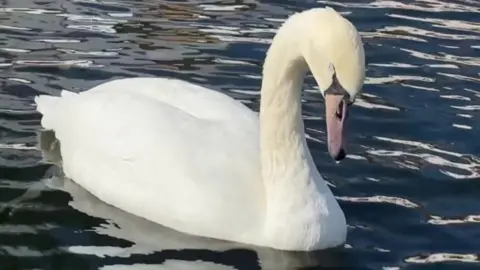Swans on Norfolk Broads with symptoms of avian flu to be euthanised
 Mike Page
Mike PageWildlife experts patrolling the Norfolk Broads to find and euthanise swans dying from bird flu said the number of dead swans is "unbelievable".
Teams from the Marine and Wildlife Rescue (MWR) and the RSPCA are using vessels to search the waterways for severely-ill birds.
Some 35 bird carcasses were found on a single five-mile stretch of river between Horning and Wroxham.
MWR says the outbreak appears to be particularly acute among swans.
Dan Goldsmith from MWR said: "These birds have to be euthanised because they will not get better, and you can't take them to a bird rehabilitation centre if they are suspected to have the disease, because it could spread."
Mr Goldsmith echoed concerns raised Paul Rice, chairman of the Broads Society, that the Department for Environment, Food and Rural Affairs (Defra) should be doing more to respond to the outbreak among wild birds.
"We have contacted Defra and there's no coordination at all," said Mr Goldsmith.
Defra advice to the general public is to leave corpses alone and report findings, but that landowners should dispose of birds themselves.
The government has declared East Anglia to be the epicentre of the UK's worst-ever avian flu outbreak and imposed strict biosecurity measures from Wednesday.
It means birds must be kept indoors across Norfolk and Suffolk, which includes the Broads National Park, and parts of Essex.
 Getty Images
Getty ImagesThe measures apply to poultry and captive birds, regardless of type or size, following a decision by the government's chief veterinary officer, Dr Christine Middlemiss.
More than 170 avian flu cases have been found across England in the past year, resulting in the culling of 3.2 million poultry and captive birds.
Wildlife groups are calling for more action from Defra to deal with the wild bird contagion.
Mr Goldsmith said: "We have had issues in the past but nothing on this scale. The sheer number of dead swans on the Broads is unbelievable.
"It's mostly been swans suffering with symptoms, some of them are not very accessible.
"There are dead ones on the waterways, on banks and private quays. I have never seen it this bad before."

If a sick bird is found the RSPCA euthanise it by injection, which Mr Goldsmith said was quick and painless.
"If there are fresh carcasses they may take them for analysis but there's a lot of conflicting information," Mr Goldsmith said.
"There seems to be a reluctance to declare it as a big incident. My colleagues call Defra and say they have euthanised birds but they will say 'it's just three, they don't want them'."
When contacted by the BBC, Defra referred to its latest guidance, which is reiterated by the Broads Authority, which is responsible for managing the national park.
Dr Middlemiss described the rise in infections as a "global phenomenon".
The UK Health Security Agency advised that the risk to human health was very low.

Find BBC News: East of England on Facebook, Instagram and Twitter. If you have a story suggestion email [email protected]
